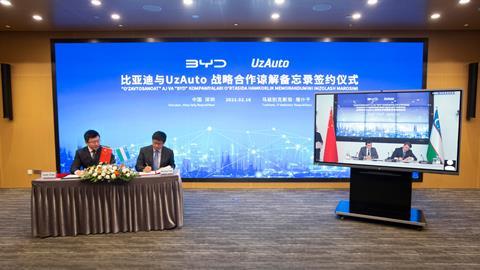Under a recently stuck agreement, BYD Uzbekistan Factory, a joint venture between the Chinese electric vehicle (EV) maker and Uzbek state-owned Uzavtosanoat, aims to assemble 500,000 EVs and hybrids per year, turning the country into the largest automotive manufacturer in the post-Soviet space.
On March 18, Uzbek president Shavkat Mirziyoyev signed a decree approving the investment agreement between Uzavtosanoat and BYD Auto, under which the parties are due to invest $160m into establishing a vehicle assembly plant in the country. Uzavtosanoat will hold a 60% stake in the factory, and BYD will be given a 40% share.

The joint venture aims to make BYD vehicles from complete knockdown (CKD) kits with an initial output of 50,000 vehicles per year, scheduled to begin by the end of 2024. Some report indicate that the plant will open its doors in June.
Under the agreement, the investors will localise automotive components sourcing and spare parts production. This shift in production could have a significant impact on the local supply chain, boosting local businesses and promoting economic growth.
When full annual production hits 500,000 units a year, the localisation target set at 60%. No concrete timeframe has been provided but in December 2023, Mirziyoyev said Uzbekistan aims to boost vehicle production to 1m units a year by 2030.
Setting the stage
As the plant will focus on the production of EVs and hybrids, the Uzbek government is also looking into investing heavily in establishing relevant infrastructure in the country, where last year, nearly a third of total imports or 25,000 finished vehicles, were delivered with alternative powertrains.
Official government figures indicate that in 2023 Uzbekistan imported 8,948 BYD vehicles worth $293m, making the average vehicle price for a BYD vehicle $32,744.
Within the same decree, the Uzbek President ordered the government to limit disorderly imports of EVs and hybrids to the country, explaining that the privately imported models are not adapted to local climate and road conditions, and lack the official manufacturer’s warranty.
In reality, this is believed to be a part of the deal with BYD, called to ensure the Chinese automaker has no viable competition in the 35m Uzbek market.
The decree does not stipulate how exactly the government should tackle private EV and hybrid imports, only that it should do so based on the existing legislation and WTO principles.
The BYD contract will help Uzbekistan become the largest vehicle manufacturer in the post-Soviet space. This is a significant shift in the regional automotive industry, as Russia continues to grapple with the aftermath of the 2022 slump triggered by the mass exodus of western carmakers.
Trade flows reverse
For years Russia has been the dominant force in the post-Soviet automotive industry, accounting for over 80% of the region’s output and a lion’s share of imports for most countries. However, with thiss announcement of vehicle production in Uzbekistan, these times of Russian dominance are likely to become a thing of the past, signaling a significant shift in the regional automotive landscape.
In 2023, Uzbekistan manufactured 395,000 finished vehicles, 25% up compared with the previous year, according to government estimates. In the meantime, the domestic market experienced a staggering 40% jump in sales to 452,000 units, the official figures indicate.
Russia manufactured 537,000 finished vehicles last year, against 1.3m units in 2021 and 1.72m in pre-coronavirus 2019.
UzAuto Motors has already become the biggest automaker in the post-Soviet space, ahead of the Russian Avtovaz, which assembled only 374,000 finished vehicles last year.
Exports are expected to be a significant part of the BYD business development strategy in Uzbekistan, the decree said, not providing additional details.
In December 2023, the Uzbek government kicked off a logistics subsidy for finished vehicle exports, expecting to spend around 200 billion soms ($15.8m) on a partial reimbursement of transport costs associated with delivering finished vehicles to foreign customers this year.
A portion of vehicle exports is due to be exported to Russia, though UzAuto Motors and the Uzbek authorities refrain from making concrete forecasts on the export volumes.
In 2023, Uzbekistan exported finished vehicles worth $287m, primarily to other post-Soviet countries.
One other development to factor in this year is that 2024 is the first year when the national budget stopped subsidising utilisation fees for exported vehicles, so it is yet to be seen whether the change in the government policy will aid automotive exports.


























![Global[1]](https://d3n5uof8vony13.cloudfront.net/Pictures/web/a/d/s/global1_726550.svgz)













No comments yet